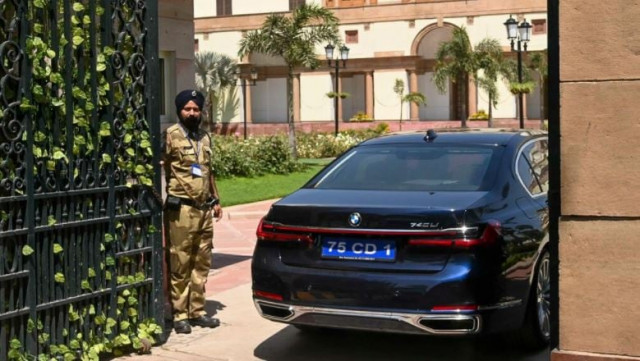Russia's Lavrov praises India's stance on Ukraine
India has abstained from multiple United Nations resolutions censuring Moscow

Russia's foreign minister on Friday praised India's refusal to condemn the Ukraine invasion, saying Moscow and Delhi would find ways to circumvent "illegal" Western sanctions and continue to trade.
India has abstained from multiple United Nations resolutions censuring Moscow, calling only for an end to violence, and has increased its oil purchases from Russia, its biggest supplier of arms.
"These days our Western colleagues would like to reduce any meaningful international issue to the crisis in Ukraine... (We) appreciate that India is taking this situation in the entirety of facts, not just in a one-sided way," Sergei Lavrov said in New Delhi.
Read more: Russia to terminate gas supply contracts if 'unfriendly' buyers refuse to pay in roubles
"Friendship is the key word to describe the history of our relations, and our relations were very sustainable during many difficult times in the past," Lavrov said, speaking in English.
His counterpart S. Jaishankar reiterated "the importance of cessation of violence and ending hostilities" and said "disputes should be resolved through dialogue and diplomacy".
Western financial sanctions have reportedly made it difficult for India to pay Russia for imports including arms, oil, rough diamonds and fertilisers.
Russia has written to India's defence ministry requesting clearance of back payments worth $1.3 billion, according to the Economic Times newspaper.
India and Russia are working on a rupee-rouble mechanism to facilitate trade and get around Western sanctions on Russian banks, according to media reports.
Also read: India set to bypass US dollar for trade with Russia
Lavrov told reporters he was confident the two countries would find a solution.
"Many years ago we started moving in our relations with India, with China, with many other countries from using dollars and euros to more and more use of national currencies. Under these circumstances this trend I believe will be intensified," he said.
"We will be ready to supply to India any goods which India wants to buy... and I have no doubt that a way will be found to bypass the artificial impediments which illegal unilateral sanctions by the West create."
India however is in a tricky spot since the Ukraine crisis has pushed Russia closer to China.
Lavrov arrived in Delhi on Thursday from China, where he had hailed Beijing as part of a new "multipolar, just, democratic world order".
Moscow has declared a "no-limits partnership" with China, which has also refused to condemn Russia's invasion.
India shares Western alarm over China's growing assertiveness in the Indo-Pacific region, and is a member of the so-called Quad alliance with the United States, Japan and Australia.
Twenty Indian and four Chinese troops were killed in a brawl on their disputed Himalayan border in 2020, sparking a sharp deterioration in their already frosty ties.
Senior US official Daleep Singh, Washington's chief sanctions strategist, was quoted by local media as saying India could not rely on Russia if there was another clash with China.
"Russia is going to be the junior partner in this relationship with China. And the more leverage that China gains over Russia, the less favourable that is for India," Singh said in a parallel visit to Delhi on Thursday.
"I don't think anyone would believe that if China once again breached the Line of (Actual) Control, that Russia would come running to India's defence," he added, referring to the India-China border.
Singh said the United States was ready to help India diversify its energy and defence supplies but warned of "consequences" for countries that circumvent sanctions on Russia.
"We are very keen for all countries, especially our allies and partners, not to create mechanisms that prop up the ruble and that attempt to undermine the dollar-based financial system," he said.
Lavrov was due to meet Prime Minister Narendra Modi later on Friday, saying he would pass on Russian President Vladimir Putin's "best regards".



















COMMENTS
Comments are moderated and generally will be posted if they are on-topic and not abusive.
For more information, please see our Comments FAQ